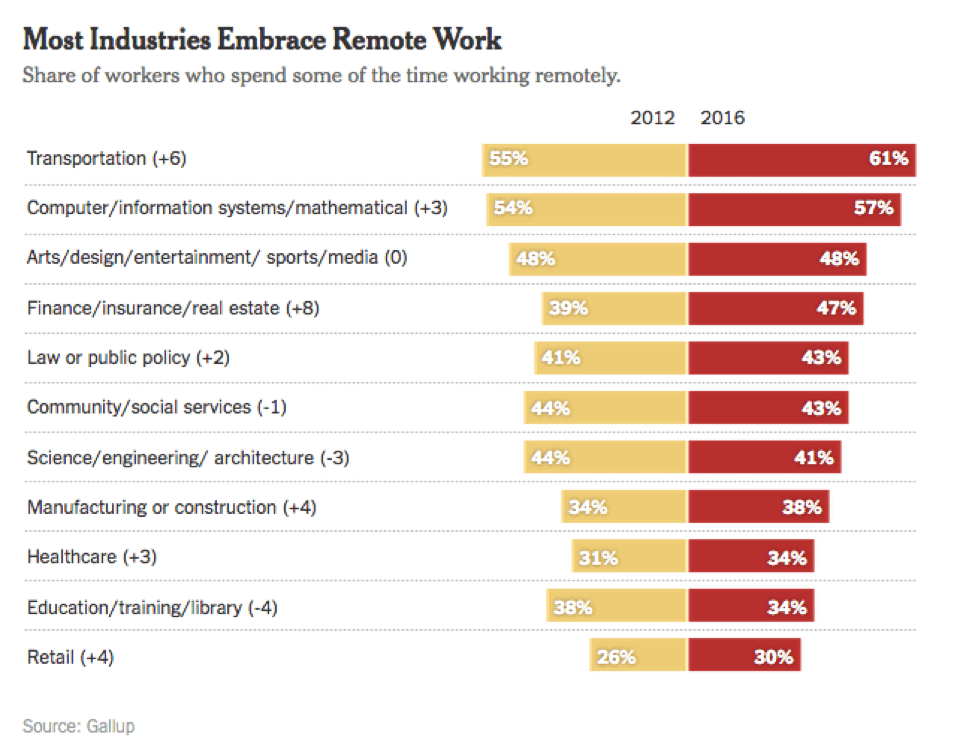In the world of project management, change is constant. From technology improvements to shifts in how teams collaborate and work together both in-house and around the world, it can sometimes feel overwhelming to keep up with the rapid pace of flux.
So what are some of the biggest changes in the world of project management, and what do you need to keep an eye out for in the coming months? Let’s take a deeper look into four specific trends disrupting project management right now.
4 Major Trends Transforming Project Management
There are many, many trends shaping the project management landscape right now, but we’re going to focus in on four in particular: Remote work, generational shifts, internal shifts in PM approach, and artificial intelligence.
Remote Work
The New York Times reported that more than 43% of US-based employees are working remotely (at least part of the time) as of 2017— an increase of 4% from the previous year. The shift, surging from increased demand for flexibility and efficiency away from the noisy, distraction-ridden office environment, also extends into the world of project management. Most industries, in fact, have started to embrace the idea of remote work.

However, with remote work, there’s a need for a shifted mindset around traditional project management. Teams will need to build trust, schedule more virtual meetings to keep lines of communication open, get the right tools, build better onboarding strategies, and make time for semi-regular in-person meetups.
Are there pros and cons to remote project management? Absolutely. But with an open mind and a strategy for effective collaboration, being open to remote opportunities can help you better retain team members, reduce churn, and enable work whenever and wherever it needs to happen.
Generational Shifts
Data shows that in the US, Gen X and Millennials make up 34% of the current workforce, and that they’ll outnumber the Baby Boomers by 2028. Right now, however, there can be as many as five different generations of people within the modern project management working environment today, which means there are a lot of different elements to balance. From communication styles and preferences to optimal workflows and technology training, how do you manage such a diverse team?
Many are taking a multi-faceted approach to better manage the generational gaps between team members and focusing on developing skills for effective leadership. This means better understanding what employees from each generation need, want, and expect at work.



With a foundation of understanding about what employees in each different generation is looking for within their work, project managers can better oversee projects and play to the strengths of their team members to improve day-to-day working relationships and to get top-notch deliverables. That means fewer conflicts, more efficient projects, and stronger end results.
Internal Shifts Towards Project Management
At the micro level, we can expect to see more internal shifts in how people approach project management. In large part, this means taking a more agile approach to projects so there is greater ability to adapt to changes in customer desires, technology, and timing.This is often accomplished by adoption of new project management tools, which can optimize processes around collaboration, deliverables, and more.
So what can managers do to jump start these internal changes?
- Start by getting buy-in around new tools. Explain why you’re introducing changes and what impact and results it will help produce. Change can feel intimidating, but when a it’s fully explained and feedback is collected from the team as a whole, it can make the experience feel more like a group effort rather than a mandated change.
- Listen to feedback. If team members are struggling with certain processes, facilitate training and answer questions.
- Measure success. It’s important to make sure the changes are producing positive results–not hurting KPIs like time spent per deliverable, your bottom line, etc. If you’re noticing negative impacts, that’s an indicator that something in your project process is broken–and needs fixed right away.
Artificial intelligence
Artificial intelligence is changing project management in that it’s helping make what used to be time-consuming manual tasks much more efficient and fault-proof. From risk mitigation, to greater efficiency, the automations made possible by artificial intelligence are becoming one of the most quickly adopted resources.
Chatbots, for example, are being used to remind team members to update and share progress on projects, while other AI tools are being leveraged for mundane tasks like data merging, logistics, etc. It can also be used for things like:
- Improving assessments to spot risks
- Using metadata to detect issues
- Facilitating communication for better accuracy
- Coordinating tasks for higher efficiency
Adoption of AI won’t happen overnight, but we can expect to see it more widely used in the near future. Preparing now and embracing the improvements this technology can offer can give you a competitive advantage over slower, less agile teams who are slower to adopt and harness these tools.
What This Means for Project Management (And How to Prepare)
So we know some of the major shifts that are happening right now,but what do they mean for project management, and how can you prepare yourself to stay on the cutting edge?
Education is the first step. Before diving into new investments into tech or making radical shifts in how you approach projects, it’s important to have a strategy, to know how you’ll present your new ideas, and to determine how you’ll inspire buy-in. Let’s look at a few different resources that can help jumpstart your efforts.
Get In the Know About the Future of Project Management
These articles provide deeper insight into the future of project management and share a few proactive steps that can be taken:
- 5 trends that will transform project management
- The Skills Project Managers Will Need in 2025
- The future of project management in a digitized economy
Read (or Listen to) Key Books
Sometimes the best way to learn is through reading or listening to an audiobook. Check out a few must-read books, such as:
- Lead Inside the Box: How Smart Leaders Guide Their Teams to Exceptional Results
- Brilliant Project Management
- Getting Things Done: The Art of Stress-Free Productivity
- Peopleware: Productive Projects and Teams
- Agile Change Management: A Practical Framework for Successful Change Planning and Implementation
Get Inspired by TED Talks
TED Talks can help provide some high-level inspiration and mind-opening subject matter that will get you excited to head up the changes ahead:
- Shawn Achor: The Happy Secret to Better Work
- Itay Talgum: Lead Like Great Conductors
- Simon Sinek: How Great Leaders Inspire Action
- Yves Morieux: As work gets more complex, 6 rules to simplify
Wrap Up
The future of project management is a bright one, and there are major improvements coming down the pipeline that will help teams work smarter, not harder. With employee-based shifts (like the rise in remote work and multi-generational teams) and improvements in technology (like artificial intelligence and adoption of robust project management tools), there’s a lot to look forward to.
As long as you keep an open mind and embrace the changes ahead, you and your team can benefit from the radical changes happening in the project management space.







